We want harassment-free campuses

Universities are supposed to facilitate an environment for rigorous academic activities, but that has not been the case in the universities of Bangladesh for a long time. Especially in public universities, we see an overbearing hustle for power and control. This has created an environment that is naturally not student-friendly, and certainly not conducive to learning.
In this context, I would say student harassment, particularly towards female students, has been normalised—in other words, it is systematically allowed to happen.
It goes without saying that the victims or survivors of harassment we are hearing from are just the tip of the iceberg. Those who do come forward are not only subjected to victim-blaming, but are also isolated and ostracised. They are subjected to more harassment, such as being given low marks, failed in class, or threatened. This not only scares the victims in question, but also many other students and deters from complaining. A climate of fear has been created this way.
In most cases, the oppressors are not ostracised; instead, they are supported within the administrative power structure of the institution. For example, in the case of the Department of Film and Television Studies at Jagannath University (JnU), the department chairman assisted the accused teacher. Meanwhile, a student of JnU's law department alleged that the harasser was protected by the proctor. These prove that in universities, the protectors are actually becoming the predators, or at least enablers of predators. Even other teachers of the university or department, who are not directly involved, remain silent and try to save their own skin. They do nothing to stop harassment.
The present condition on university campuses has allowed cases of repeated harassment by single individuals—or, in other words, serial harassers. This is because these individuals do not face adequate repercussions. The students who are the perpetrators are often backed by the political structure of the ruling party, as a result of which they don't face appropriate punishments, and in many cases no consequences at all for their actions. They continue to exert power on campuses.
Student politics is a significant part of the history of this nation and its independence. But now, students involved in politics do not work for the common people; they do not even work to address the issues students are facing, including harassment. They have become power-hungry agents of political parties. Supported by the current ruling party, they are mainly engaged in taking a hold of the campuses and maintaining power. The welfare of general students is not their goal; rather, they exert their strength through torturing and harassing other students.
Students have become tools for the political parties, and those who accept this and get involved in politics supported by the ruling party get seats in the halls, get protection, and many legal and illegal benefits. Those who don't participate live in inhumane conditions. They are physically and mentally tortured in "gono rooms." They are forced to participate in party programmes. Naturally, they can't rack up the courage to speak against these unethical practices—if they do, they face more torture and harassment.
This crushes the general students' sense of freedom and agency and makes them accept subservience as the natural state. Protesting or having different thoughts becomes abnormal for them. When this kind of oppressive environment takes over university campuses, all students live under repression—even those who do not get directly abused.
Needless to say, it is even worse for female students. A recent study by Rajshahi University found that 90 percent of female students who are victims of harassment do not complain. This is because of multiple reasons: the culture of impunity in universities, political influence, lack of awareness about where to get justice, uncooperative attitude of teachers, shame, social pressure, and fear that their families may stop their education completely. So, many victims decide to bear with the harassment and try to finish their studies without complaining.
Kazi Farzana Mim of Jagannath University, who filed a complaint two years ago, has been fighting alone for so long, and only recently, after appealing to the president, has the authorities put the harassing teacher and associate chairman on trial. For many, the fight becomes extremely difficult. While some live with the trauma throughout their lives, some choose the path of suicide.
There is no precedent for the institution to take action on any complaint at their own initiative. Various news reports show that the 2009 High Court directive on anti-sexual harassment policy is not being properly implemented in our universities. In many places, there is no cell to report complaints. Even if there is a cell, it is not created in accordance with the proper rules. Most importantly, all members of the university should be clearly informed about this policy. However, in most universities, students are not informed about it during orientation. They do not even know where to go if they are harassed. Each department and residential hall of the university must appoint a counsellor so that students can approach them whenever needed.
As soon as teachers and students with cases of harassment are identified, the university should take suo moto action to bring them under accountability. Their past records should be checked and verified in all matters including the appointment and promotion of any teacher.
To the teachers who want a harassment-free university but remain silent, we say: those who tolerate injustice are also complicit in that crime.
Merely reacting to cases of harassment after they happen cannot stop this culture of repression. Rather, we need a democratic culture on the campuses, where the voices and rights of all participants are ensured. And it is the responsibility of the university authorities to create and maintain that environment.
Translated from Bangla by Naimul Alam Alvi.
Dr Gitiara Nasreen is a media analyst and professor at the Department of Mass Communication and Journalism in Dhaka University.
Views expressed in this article are the author's own.
Follow The Daily Star Opinion on Facebook for the latest opinions, commentaries and analyses by experts and professionals. To contribute your article or letter to The Daily Star Opinion, see our guidelines for submission.

 For all latest news, follow The Daily Star's Google News channel.
For all latest news, follow The Daily Star's Google News channel. 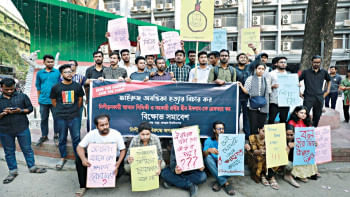
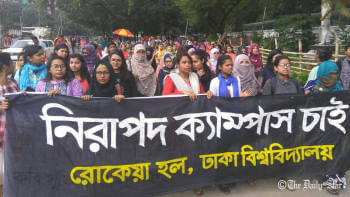

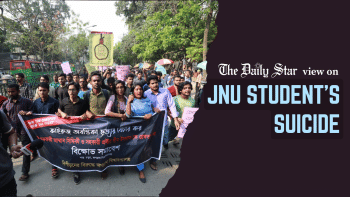


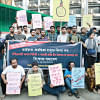



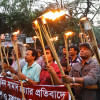


Comments